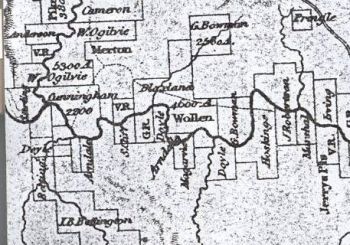Alexander Anderson
Alexanderson Anderson No. 192. Grant of 1000 acres 9 February 1825. Arrived in Australia as First Officer on the convict ship Grenada in 1819. Died in 1882

Alexanderson Anderson No. 192. Grant of 1000 acres 9 February 1825. Arrived in Australia as First Officer on the convict ship Grenada in 1819. Died in 1882
James Arndell No. 170a. Grant of 100 acres 19 October 1824. Born at Caddai in 1802, son of Surgeon Thomas Arndell
Thomas Arndell No. 155. Grant of 300 acres 26 August 1824 at the junction of Greig's Creek with the Hunter River. Son of Surgeon Thomas Arndell
James Brindley Bettington Estate Martindale
George Blaxland No. 169. Granted 500 acres 19 October 1824. Estate Wollun
Charles Cameron Arrived in Australia in May 1822 in command of a detachment of 3rd Regt, Guard on the convict ship Phoenix
Peter Cunningham No. 195. Granted 2200 acres 11 March 1825. In 2 portions. Estate Dalswinton
Cyrus Matthew Doyle (b) No. 206. Granted 860 acres 13 May 1825. In two portions
Rev. John McGarvie - Arrived per ship Greenock in 1826
Merton Estate of William Ogilvie. Afterwards acquired by the White family
James Robertson - Arrived per ship Providence in 1822
Mr. Ogilvie possesses here six thousand acres, consisting of alluvial flats and lightly-timbered forest land backwards, bounded by a moderately high ridge. A plain of fifty acres of rich land (without a tree upon it) is situated in the middle of the grant, overlooked by a beautiful swelling hill, equally clear, of the finest sort of garden mould, and covered with luxuriant grasses. The Goulburn enters Hunter's river opposite to the bottom of Mr. Ogilvie's grant, the plains on each side being hemmed in by woody ridges of moderate elevation, toward which the back land gradually rises.
Contrary to what is generally found in other parts of the country, the ridges upon the upper part of Hunters river are almost uniformly flattened at the top, forming little miniature hills and valleys covered with fine soil of moderate depth, and abounding in grass, which makes them the great resort of the kangaroos and cattle in the winter season. Behind the ridge bounding Mr. Ogilvie's farm, at four miles distance, is Mr. George Blaxland's residence, where several flocks of fine woolled sheep and a large herd of cattle are kept. Captain Pike brought out to his residence here, a good assortment of Saxon and Spanish Merinos, which promise to be a great benefit to the flocks on this river, besides the advantages he will individually derive from them. Twenty four miles above this, at Holdsworthy Downs, Lieut. Gibbs,
Mr. Carlisle R.N. and the Messrs Little are settled, with Mr. McIntyre agent for Potter Macqueen M.P. Farther on again, several young Scotchmen have taken grants upon some fine clear downs along the banks of a branch of the Goulburn. All these gentlemen possess sheep, and indeed there is no settler of any note upon this extensive river, who is not turning his attention to the production of fine wool.
The Jerrys Plains district, or electoral division, was discovered by John Howe and party about the time Singleton, or Patricks Plains, was lit upon by that little band of intrepid explorers. Indeed, it was by John Howe that the name Jerry's Plains was given to the locality. It appears that a servant, whose Christian name was abbreviated to the sobriquet of 'Jerry,' who accompanied Mr Howe's party, was lighting a camp fire on the plains, where the party had just arrived, and the weather and wood being damp, poor Jerry had recourse to the aid of powder, and through heedlessness in the use of it, effected an explosion, from which he was the sufferer ; and in order to give Jerry some solace to assuage for the price of his mishap, the plains where he distinguished himself were called after him. - Singleton Argus 30 December 1896